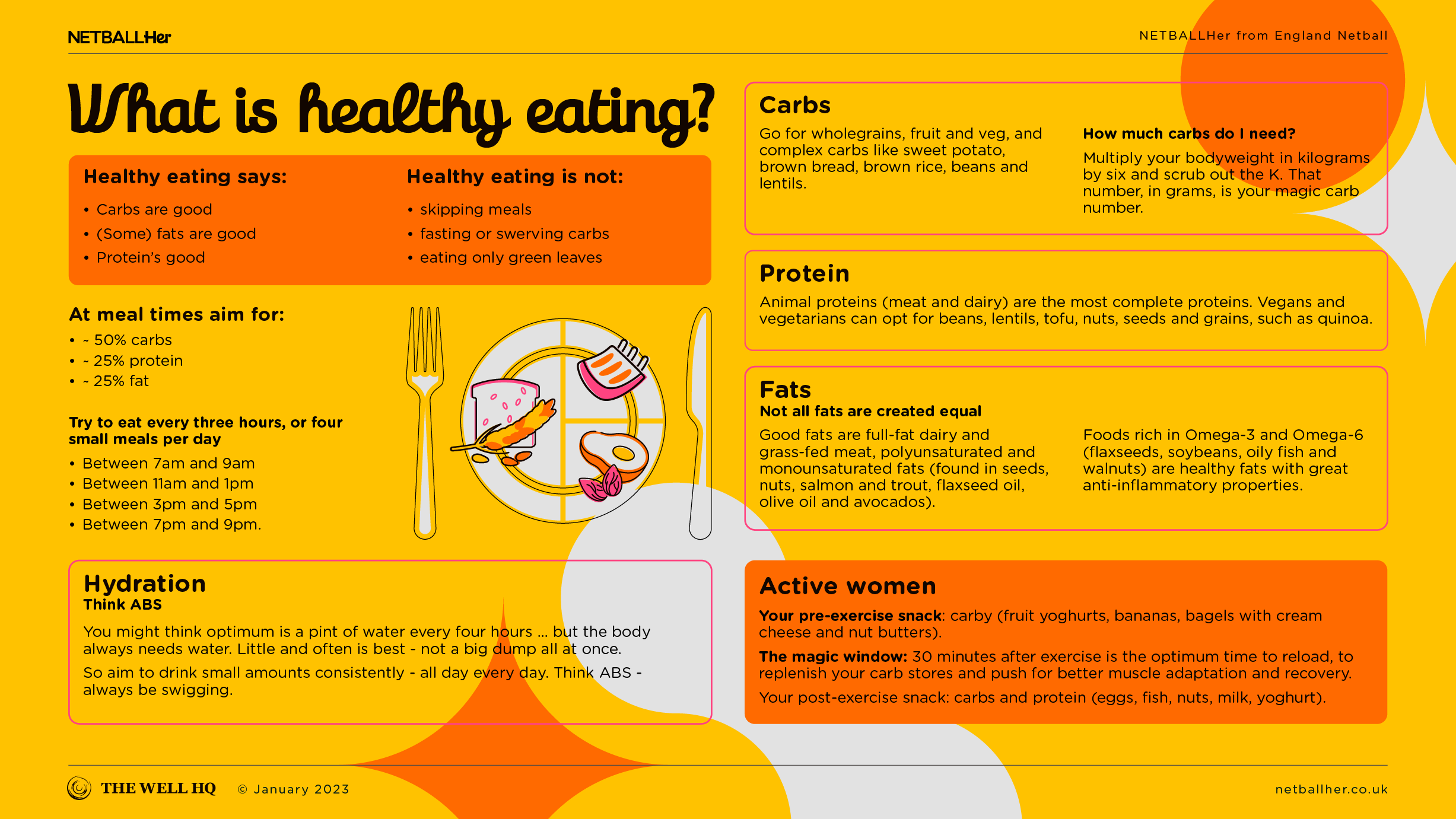Click play for an audio readthrough of this article
Baz interviews GP, nutritionist, and menopause specialist Dr Mandy Leonhardt to get the lowdown on nutrition and its value through perimenopause and midlife.
If you can’t watch it right now, we’ve got you covered. Here’s a rundown of Mandy’s main points and you can see more of her work on her website.
1. Why is nutrition in midlife different?
Women are vulnerable at various key life stages such as puberty, pregnancy, post-natal and, of course, perimenopause and menopause.
Perimenopause brings massive oestrogen fluctuation and that impacts the body and the brain.
When faced with tiredness, pains, low mood, impatience, stress and so on we need to pay extra attention to our diet and optimise it in the best and most realistic ways possible.
2. I already eat well so do I need to make changes?
If you’ve already established great nutrition habits through life then you may not need to change much.
But we know that’s not everyone’s reality and midlife is a particularly full-on, stressful stage. We often see midlife women reaching for crutch foods such as sugar and carbs, alcohol and caffeine and those – while they might feel like they bring relief – can make things worse.
So good nutrition is here to help. People tend not to think about it when they’re functioning just fine but it’s one of the top tools we have in the toolbox.
3. What is good nutrition in midlife?
It varies, individual by individual. Some women have the baselines in place, others don’t. Some find it easy to cut out alcohol or sugar, others don’t. A person’s budget, resources and practicalities play a part too.
So it really depends on the individual, their life and their starting point but there are a few universal truths:
- Drink more water
- Identify foods that make you feel better … or worse
- Aim to eat good, healthy meals in a calm environment
- Avoid eating on-the-go or relying on fast/ convenient food
- Remember alcohol isn’t a friend so try to cut it out
- Think of protein as a vital part of each meal
- Don’t aim for perfection, think 80/20
On the last point, thinking about nutrition shouldn’t dominate your whole day so don’t be too super-strict on maintaining and managing it. Aim for 80/20 and don’t stop yourself enjoying the odd treat or meal out – we need those things too.
4. Why do we experience weight-gain in midlife?
It’s a cocktail of factors.
Changes in the gut and microbiome occur over time so older women do have a different bacterial profile than younger women. Metabolism as such doesn’t change – the “middle-age spread” isn’t inevitable – but the risk of insulin resistance does increase.
One of the biggest factors in weight – and health generally – is sleep. Inadequate sleep often causes a person to overeat calorie-dense foods and sugar the next day to buoy up energy levels. A well-rested brain is more likely to feel full after a salad because the signalling works much better.
Also, and quite frankly, women do tend to become more sedentary as the years go on and that in itself leads to weight-gain, while denting muscle and bone health for a vicious cycle of inactivity.
5. What specific foods ease specific symptoms?
Hot flushes and night sweats: soy
Products such as soy milk, edamame beans and tofu contain a molecule which positively interacts with oestrogen receptors, positively influencing night sweats and hot flushes.
Breast tenderness: iodine
Iodine can be helpful to alleviate breast tenderness so try to incorporate things like seaweed, seafood and iodised salt.
Stronger skin and bones: omega 3
Omega 3 hasn’t yet been tainted with the superfood label so it’s still relatively cheap and hugely helpful for skin and bones. Sardines especially are a cheap, versatile and sustainable source of omega 3.
Bone health: calcium
Calcium is a solid way to protect future bone health. I personally don’t have a problem with dairy so I’d recommend it, but you can get calcium without it via hummus and sesame seeds.
Brain fog/ stress: magnesium
Magnesium is found in almost all green leafy veg (kale, broccoli) as well as nuts and seeds and can have a calming effect on the brain.
6. Can nutrition alone ease my symptoms?
Maybe (but probably not)
Nutrition can be helpful and having a good baseline diet’s a great thing … but it probably won’t solve all life’s problems. Soy can’t magic away a chronic lack of sleep.
We know 25% of women will experience debilitating menopause symptoms so where lifestyle can’t make the difference we have medications, treatments and other options to support us.
Some women are so determined to get through menopause without meds but it is absolutely not a failure if you have to turn to them for extra support.
7. Try to add more than you take away
Tasked with boosting nutrition, a lot of women set about eliminating foods and food groups. I always argue to go the other way: add foods; don’t remove them.
It’s a bit of a mindset shift: what can I give myself and what can I try?
8. Fibre is good (constipation is not)
Two foods I see women consistently cut out are gluten and fibre, primarily because of bloating. But a little bloating is normal and fibre especially keeps things moving when we’re at a greater risk of constipation.
Foods such as chia and flax seeds and Omega 3 three interact with oestrogen and feed the good gut bugs to keep up bowel activity. These foods can also reduce the risk of diabetes and some forms of cancer, and lower cholesterol. So fibre is good and you can limit bloating by introducing or reintroducing it slowly and gradually.
Top tip
Keep a seed pot at the side of your toaster (or within easy reach in the kitchen) so sprinkling them on salads, sandwiches, porridge and so on becomes an easy no-brainer.
9. Fasting – good or bad?
In the past I’ve recommended these strategies but the more evidence that’s come out the more I’ve moved away from doing so. There was some talk initially about such strategies reducing the risks of dementia but I haven’t read anything that convinces me of that … although I’m open to more evidence if you have it!
It depends on the individual and it depends on the goal. If the goal is weight loss then I don’t have issues with a short-term Time Restricted Eating strategy as long as nutrients are consumed in the right amounts.
But beyond that I don’t think these are good for women in menopause. Body and brain are already dealing with oestrogen fluctuation so why stress the body further and deprive ourselves of vital fluid and energy. Midlife is full-on enough and we need energy for exercise, cognitive function, gut activity, muscles and more, this isn’t time to go without.
10. Mandy’s top tips
Top up the health piggy bank now
Metabolic changes start in the 30s and 40s so that’s the time when you should pay into the health piggy bank. Establish good habits in those years — and build a good base — and it could mitigate symptoms that come later.
Breakfast protein
Evidence plus experience tells me that breakfast really is the most important meal of the day. Overnight we’re in a fasting, catabolic state … and we want to ease ourselves out of that with a good portion of breakfast protein (such as scrambled eggs or if you’re vegan a plant-based protein) to set your muscles up for the day.
Environment’s important
Apart from getting the basics right (see point #3) it’s important to consider where and how you eat. Eat consciously. Try not to eat in front of screens, try to go slow (don’t gulp or rush) and enjoy it. Try to also steer clear of alcohol (or the temptation to drink alcohol) because it’s empty calories, exacerbates stress levels and dents the functioning of both your liver and brain.
As a reminder, the content of the course belongs to The Well HQ. You have permission to access and use the content yourself or, if you are an organisation, for the number of users selected, but are not otherwise permitted to share such content with others, all in accordance with our Course Terms and Conditions.

